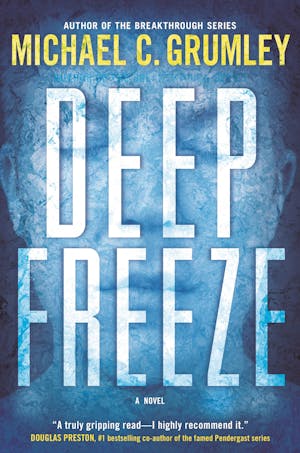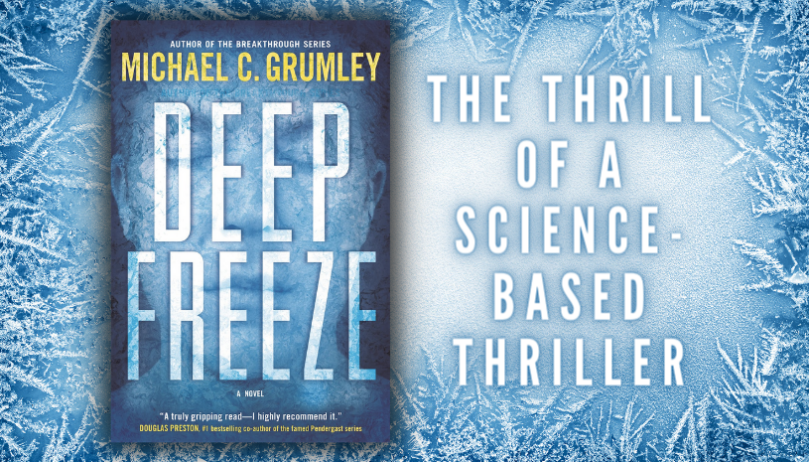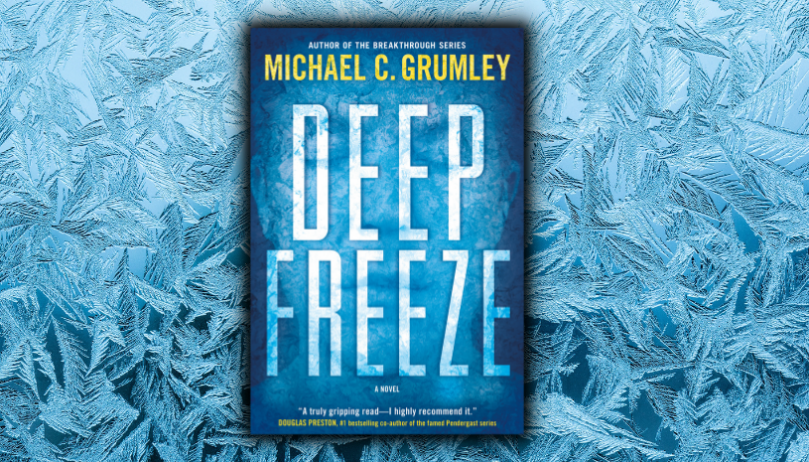 From the bestselling author of the Breakthrough series: In his next near-future thriller, Michael C. Grumley explores humanity’s thirst for immortality—at any cost…
From the bestselling author of the Breakthrough series: In his next near-future thriller, Michael C. Grumley explores humanity’s thirst for immortality—at any cost…
The accident came quickly. With no warning. In the dead of night, a precipitous plunge into a freezing river trapped everyone inside the bus. It was then that Army veteran John Reiff’s life came to an end. Extinguished in the sudden rush of frigid water.
There was no expectation of survival. None. Let alone waking up beneath blinding hospital lights. Struggling to move, or see, or even breathe. But the doctors assure him that everything is normal. That things will improve. And yet, he has a strange feeling that there’s something they’re not telling him.
As Reiff’s mind and body gradually recover, he becomes certain that the doctors are lying to him. One-by-one, puzzle pieces are slowly falling into place, and he soon realizes that things are not at all what they seem. Critical information is being kept from him. Secrets. Supposedly for his own good. But who is doing this? Why? And the most important question: can he keep himself alive long enough to uncover the truth?
Deep Freeze is a fast-paced, pulse-pounding story that will keep you on the edge of your seat from start to finish. Read below to see Michael’s take on science-based thrillers and why they’re so exciting to write!
By Michael C. Grumley:
There is something truly exciting about writing science-based thrillers. Of course, many great genres exist, but technothrillers stand apart in a very interesting way.
Science-based technical thrillers are, at their core, idea-driven stories. Naturally, all books have ideas in them. New concepts or approaches to a particular situation or storyline. Or perhaps a fresh perspective or viewpoint on how a story is told. All interesting and completely valid. But what makes technothrillers different is that most are told from the cutting edge of human existence.
It’s been estimated that up until the nineteenth century, the whole of human knowledge doubled nearly every century. It is a staggering thought, perhaps not entirely surprising, when we consider the steady human progress that eventually led to the Industrial Revolution. It changed everything. But then came the Information Revolution. Originally born with the invention of the transistor, the information revolution really took hold in the 1980s, when the computer industry made data not just easier to store but also infinitely easier to access. And from there, the cutting edge of technology absolutely exploded.
By 1982, the great Buckminster Fuller noted that all of human knowledge was no longer doubling every century; it was now doubling every 18 months! That was in 1982! But now, after decades of technological advance after technological advance, the “knowledge-doubling curve” has also rapidly accelerated. Instead of every 18 months, people like David Schilling believe our knowledge now doubles in less than a day! Particularly following the advent of supercomputers and artificial intelligence (AI).
So, back to science-based thrillers. Why are they so exciting to write? Because the actual science and groundbreaking abilities these stories are based on are now being discovered almost daily.
And that’s why it’s so exciting to write them. Writing stories that are both character-driven AND idea-driven. Stories that not only delve into aspects of our humanity and human struggle but do so in a world so fascinating that humanity itself begins to change based on the advancements directly in front of us.
For example, how would humanity change not just with the idea but with the genuine possibility of extremely long lifespans or immortality? How would humanity’s priorities change? Or the way we see the world around us? What happens to everything when death begins to feel a little less… inevitable?
Until now, these were just fun mental exercises. Fantasies to ponder over dinner and a glass of wine or a fireside chat while staring up at the stars. But how does the fantasy change when the idea of immortality is suddenly in the present? You may not know this, but a LOT of fascinating research is being done on life extension and elimination of chronic disease. Fascinating research that feels almost outlandish until you remember that our knowledge is still doubling. Again and again. Not in centuries, not in months, but now in days.
The other day, I was thinking about how human ‘storytelling’ evolved over the millennia. How instrumental and integral it has been throughout all of history. How pervasive it’s been and still is in all cultures and all walks of life. And then it suddenly occurred to me. Storytelling is not something that happens occasionally. It’s not a ‘here or there’ occurrence. Storytelling happens constantly. Not just every day but in every sentence we speak. In every conveyance from one person to another. No matter what the topic. Everything we say to one another is basically a story of some kind.
So, then the question becomes, what are the most interesting stories? What are the most exciting things to talk about? Obviously, it varies depending on where we are at any given moment. But the question reminds me of an old quote from Eleanor Roosevelt. She once said, “Bright minds talk about ideas. Average minds talk about things. And simple minds talk about people.”
And again, we come back to technothrillers. Stories whose foundations are based on real technology, real science, and real ideas. Stories and ideas that focus not on what has already happened but, more interestingly, what is very likely about to happen. Good, bad, and ugly. Which, when combined with human nature, becomes truly interesting.
What would the good, bad, and ugly be if human lifespans were dramatically lengthened? Or what if computers became so powerful that our race could no longer discern what was real? Or if Artificial Intelligence soon accelerated our ‘knowledge-doubling’ to hours or even minutes?
Because these are the things that technothriller authors are currently writing about.
Now you’re ready for DEEP FREEZE.
Click below to pre-order your copy of Deep Freeze, available January 9th, 2024!







